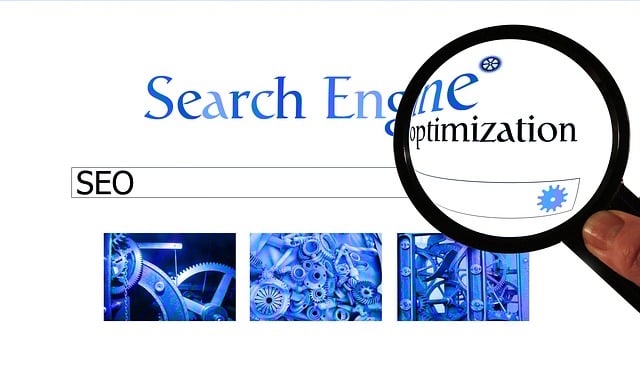User engagement and SEO are interlinked; enhancing user experience through strategic optimizations like keyword placement, mobile responsiveness, and fast loading times boosts website authority and drives organic traffic. Implementing high-quality content, intuitive navigation, and engaging visuals improves user satisfaction, increases session durations, and fosters higher engagement rates. Measuring success via key metrics allows businesses to refine SEO strategies, stay competitive in the digital landscape, and unlock the full Benefits of Search Engine Optimization (SEO).
In today’s digital landscape, understanding user engagement is crucial for online success. This article delves into the symbiotic relationship between Search Engine Optimization (SEO) and user experience, exploring how enhancing user engagement can significantly impact your website’s visibility and performance. We’ll uncover the key benefits of SEO in creating a captivating digital environment that keeps visitors engaged. From strategic website optimization to tracking user metrics, learn effective tactics to elevate your online presence.
Understanding User Engagement and Its Impact on SEO

User engagement is a key metric that measures how actively and interactively users engage with a website or online content. It encompasses various behaviors, such as time spent on a page, click-through rates, scroll depth, and user satisfaction scores. Understanding these interactions is vital because it directly influences search engine optimization (SEO) success. When users actively engage with content, it signals to search engines that the site provides valuable, relevant information, leading to improved rankings and increased visibility in search results.
The benefits of search engine optimization extend far beyond driving traffic; it ultimately aims to enhance user experience. By optimizing content for both search algorithms and user preferences, websites can foster higher engagement rates. This involves strategic keyword placement, creating compelling meta descriptions, ensuring mobile responsiveness, and implementing fast loading times—all contributing factors that encourage users to explore further, interact, and remain on the site longer. As a result, search engines recognize these sites as authoritative resources, further boosting their SEO performance and driving better user engagement in a positive feedback loop.
The Role of Search Engine Optimization in Enhancing User Experience

Search Engine Optimization (SEO) plays a pivotal role in enhancing user experience by improving website visibility and accessibility on search engines like Google. When optimized effectively, websites rank higher in search results, making them more likely to attract organic traffic from users actively searching for relevant content. This direct correlation between SEO and increased user engagement is one of the primary benefits of investing in optimization strategies.
By understanding user intent behind search queries and incorporating relevant keywords naturally into content, SEO ensures that web pages deliver what visitors are looking for. Well-optimized websites often provide a seamless experience, featuring valuable content, intuitive navigation, and fast loading times, all of which contribute to higher user satisfaction and longer session durations. Ultimately, these factors—higher rankings, increased traffic, and improved user engagement—feed into each other, creating a positive feedback loop that drives better overall performance for any online business or entity.
Key Benefits of Investing in SEO for Better User Engagement

Investing in Search Engine Optimization (SEO) offers a multitude of benefits that directly enhance user engagement. By optimizing your website’s visibility and ranking on search engines, you increase the likelihood of attracting organic traffic – visitors who actively seek out your content or services as they type relevant keywords into search bars. This targeted audience is more likely to convert, leading to higher engagement rates and potentially increased sales or sign-ups.
Furthermore, effective SEO strategies build credibility and foster trust with users. When a website consistently appears on the first page of search results for relevant queries, it establishes itself as an authority in its niche. Users perceive well-optimized sites as more reliable and trustworthy, encouraging them to explore deeper, interact longer, and ultimately engage more meaningfully with your brand or content.
Strategies to Optimize Your Website for User Retention

To retain users and encourage them to stay longer on your website, several SEO strategies can be employed. One effective approach is to create high-quality content that addresses user intent. By understanding what your audience is searching for and delivering relevant, valuable information, you can keep visitors engaged. Incorporate keywords naturally throughout your content, ensuring it remains optimized for search engines while being reader-friendly.
Additionally, improving website navigation and overall usability plays a significant role in user retention. Make sure your site is easy to navigate with clear menus, internal linking, and a logical structure. Fast loading speeds are also crucial; optimize images and code to reduce page load times, as slow websites often lead to high bounce rates. Engaging visuals, such as videos and interactive infographics, can further enhance user experience and encourage visitors to explore more of your content.
Measuring Success: Tracking User Engagement Metrics with SEO

Measuring success is a vital aspect of any digital marketing strategy, and SEO plays a pivotal role in understanding user engagement. By tracking key metrics, businesses can gauge the effectiveness of their optimization efforts. These metrics provide valuable insights into how users interact with online content, revealing patterns that can enhance overall user experience. For instance, monitoring click-through rates (CTR) from organic search results helps identify high-performing pages and those needing improvement.
Furthermore, analyzing time spent on page, bounce rate, and conversion rates offers a holistic view of user engagement. High engagement metrics indicate that users are finding relevant content, spending quality time on the site, and taking desired actions. This data is instrumental in refining SEO strategies, ensuring that the benefits of Search Engine Optimization are maximized to drive better results and foster stronger connections with target audiences.
Continuous Improvement: Staying Ahead with SEO Trends and User Expectations

In the dynamic landscape of digital marketing, Continuous Improvement is paramount for maximizing the Benefits of Search Engine Optimization (SEO). To stay ahead, businesses must be agile and responsive to evolving SEO trends and ever-changing user expectations. Regularly updating content to reflect industry developments ensures relevance and boosts search engine rankings. By closely monitoring analytics and user behavior, marketers can identify gaps and opportunities, refining strategies accordingly.
User expectations play a significant role in shaping the future of SEO. As digital folk become more sophisticated, they demand faster, more accurate, and personalized results. Incorporating voice search optimization, mobile-friendly design, and rich snippet integration are essential steps to meet these expectations. Keeping abreast of algorithm updates from major search engines allows marketers to adjust tactics, ensuring their content remains visible and engaging for target audiences.
